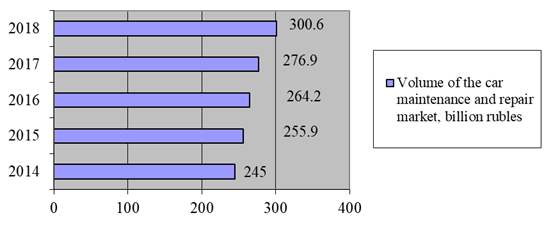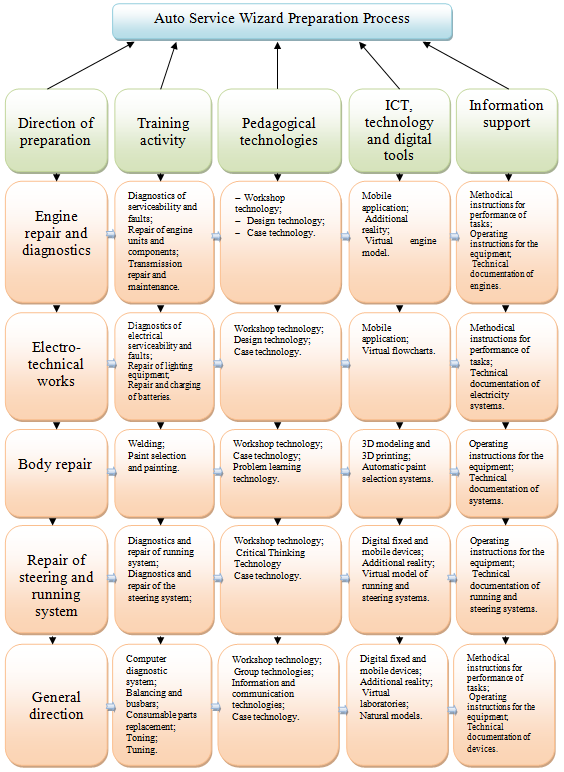Abstract
In this article the authors consider the aspects of improving the efficiency of service enterprises, improving the quality of their provision and note that the methods and technologies used in managing these services in the transition to a digital economy require new scientific solutions and justifications and their introduction into vocational education. The article updates the problems of training qualified masters, managers and improving the organization of training for the provision of car service services, the use of modern means and training technologies. Based on the approaches discussed in the article, the authors carried out modeling in order to determine specific ways to develop the training system. The result of the simulation was the model developed by the authors and presented in the article for organizing training for the field of car services in the context of digitalization, which will undoubtedly help in solving the important task of training highly qualified specialists.
Keywords: Modeling, services sector, region, car service, digitalization
Introduction
Currently, in Russia there is an unchanged increase in the number of cars. According to the traffic police of Russia over the past five years, the number of cars owned by citizens has grown from 42.3 million in 2015 to 46.3 million in 2019 (Official Statistics Traffic Police Russian Federation, 2021). This fact affects the demand for car services, the volume of which is also increasing, the number of car services is growing, and the list of services provided is expanding.
According to the Avtostat analytical agency, 608,024 cars were sold in Russia in the first half of 2020, which is 23.3% less than last year, but the very number of cars in the country increased by more than half a million in just six months. The volume of the car service market in monetary terms over the past five years shows growth and this does not take into account body repair services, car wash and tire installation (Figure 1) (Avtostat Analytical Agency, 2021). Such volumes indicate the demand for car services and attract investors to participate in the expansion of the network of car services throughout the country.

Problem Statement
This raises the problem of training qualified craftsmen who have the skills to work with modern equipment and devices for repairing and diagnosing cars that can make high-quality repairs and carry out high-level maintenance. To do this, it is necessary to improve the very organization of training for the field of car service services, its individual elements, use modern means of training, introduce new methods and technologies into the educational process.
Therefore, the methods and technologies of organizing training for the field of auto-service services in the conditions of digitalization and transition to the digital economy require new solutions that must be scientifically justified and implemented in the process of organizing the training of specialists in this field.
Research of domestic and foreign authors(Gilbert & Justi, 2016; Holcombe, 2020; Krasyuk et al., 2017; Tkachenko & Reznikova, 2018; Zainasheva, 2015) is devoted to training and further training in various branches of the service sector.
Research Questions
The results of this study should answer the following questions:
What should the training process for the services sector in the region under the conditions of digitalization contain?
What pedagogical technologies should be used in the process of training these personnel?
What is the technical and informational support of this process?
Answers to these questions will help build a model of training for the service sector of the region in the conditions of digitalization and identify specific steps for its implementation.
Purpose of the Study
The aim of the study is to determine the optimal organizational, technological and pedagogical aspects of training for the services of the region in the context of digitalization. To do this, it is necessary to build a model that reflects all of these aspects. The model should reflect the technology, technical and informational support of training process for the services of the region in the context of digitalization.
Research Methods
In order to create an effective training system for the field of auto-service services in the context of digitalization, it is necessary to simulate the organization of this training. We used structural, informational and process approaches as the basis of the simulation. In our opinion, combining these approaches in modeling allows us to obtain a multifaceted model, which can later be used to implement in practice.
The author of the structural approach in modeling is Douglas Ross. The main idea of the structural approach is to differentiate the system into functional subsystems, and then on subfunctions, tasks and processes. The advantages of the structural approach include: visibility in modeling; In-depth process analysis to identify weak, unworked locations in the system; easy to use (Mark & McGowan, 1993).
A feature of the information approach is "ensuring continuity between manual, automated and intelligent research methods. It creates opportunities for improving research methods and accumulating research information experience, recorded in objective, human-independent models and descriptions. The main advantage of the information approach is that it creates opportunities for interdisciplinary transfer of research experience and logic-mathematical methods" (Deshko, 2016, p. 22).
A process approach is used to simulate the detail of objects and subsystems. The essence of the process approach consists in dividing the functions and objects of the system into processes that step by step describe the operation of the object or functions. The advantage of this approach is the ability to optimize the operation of an object or function, reduce repetitive actions after the modeling process (Repin & Eliferov, 2013).
Thus, on the basis of the described approaches, we carried out modeling in order to determine the priority areas for the development of a training system for the field of car service services.
Findings
The result of the simulation was a developed model of organizing training for the field of auto-service services in the conditions of digitalization (Figure 2).

The model consists of five interacting subsystems: the direction of specialist training; training process; pedagogical technologies; information and communication technologies, technology and digital tools; information support. Each subsystem is a separate object or process that can be improved, modified and corrected, and detailed.
The "Preparation Direction" subsystem contains a list of the main specializations for preparing car service masters based on the main types of work. These directions can be adjusted, increased and combined in accordance with the development of the automotive industry and changes in the device of cars. The "Training Process" subsystem reflects the specific processes that future specialists are trained. These processes depend on the direction of preparation and can be supplemented. The subsystem "Pedagogical Technologies" describes directly the technologies that will be used in the training process based on the peculiarities of the tasks, the sections studied and the used information and communication technologies, technical and digital means of training. The subsystem "Information and communication technologies, technical and digital means" lists for which sections and training areas certain technical and digital devices, equipment and software will be used. The subsystem "Information support" indicates on the basis of which information materials the training process is built.
Thus, with the help of this model, it is possible to organize a training process for the field of auto-service services, identify problem areas, as well as develop on the basis of the model information, methodological, logistical, resource and management support for this training.
Conclusion
Training for auto services is an important task, the solution of which will affect not only the auto services industry itself, which undoubtedly needs high-quality specialists, both in a broad profile and in a narrow specialization, but also on road safety, reducing the number of traffic accidents due to errors in the repair and maintenance of cars in the car service, and the environmental situation, which may deteriorate due to the improper operation of the car after its maintenance at the technical service station. A sufficient number of qualified specialists will accelerate the process of modernizing car services into smartservices - new generation car services using modern digital technologies, communication technologies, and artificial intelligence elements.
References
Avtostat Analytical Agency. (2021, March 10). Dynamics of the Russian car market in the first half of 2020. https://www.autostat.ru/infographics/44674/
Deshko, I. P. (2016). Informatics in modeling. Exemplary resources and technologies, 5(17), 21-26.
Gilbert, J. K., & Justi, R. (2016). Modelling-based Teaching in Science Education. Springer.
Holcombe, A. A. (2020). Strategic Talent Leadership for Educators. Routledge.
Krasyuk, I. A., Bakharev, V. V., Kozlova, N. A., & Mirzoeva, D. D. (2017). Staffing in the sphere of trade: The main issues and prospects of solution. IEEE VI Forum Strategic Partnership of Universities and Enterprises of Hi-Tech Branches (Science. Education. Innovations) (SPUE), 48-50. DOI:
Mark, D. A., & McGowan, С. L. (1993). Structural Analysis and Design Methodology. Meta Technologiya.
Official Statistics Traffic Police Russian Federation. (2021, March 10). Report. http://stat.gibdd.ru/
Repin, B., & Eliferov, V. (2013). The process approach to management. Business process modeling. Mann, Ivanov and Feber.
Tkachenko, D. V., & Reznikova, O. S. (2018). Staffing of public services. Bulletin of the Catherine Institute, 3(43), 25-34.
Zainasheva, Z. G. (2015). Qualification on raising the municipality in the region of housing and communal services. Bulletin of the UGUES, 1(11), 178-181.
Copyright information

This work is licensed under a Creative Commons Attribution-NonCommercial-NoDerivatives 4.0 International License.
About this article
Publication Date
25 September 2021
Article Doi
eBook ISBN
978-1-80296-115-7
Publisher
European Publisher
Volume
116
Print ISBN (optional)
-
Edition Number
1st Edition
Pages
1-2895
Subjects
Economics, social trends, sustainability, modern society, behavioural sciences, education
Cite this article as:
Zainasheva, Z. G., & Mutrakov, O. S. (2021). Simulating The Organization Of Training For The Services Of The Region. In I. V. Kovalev, A. A. Voroshilova, & A. S. Budagov (Eds.), Economic and Social Trends for Sustainability of Modern Society (ICEST-II 2021), vol 116. European Proceedings of Social and Behavioural Sciences (pp. 1213-1218). European Publisher. https://doi.org/10.15405/epsbs.2021.09.02.134

